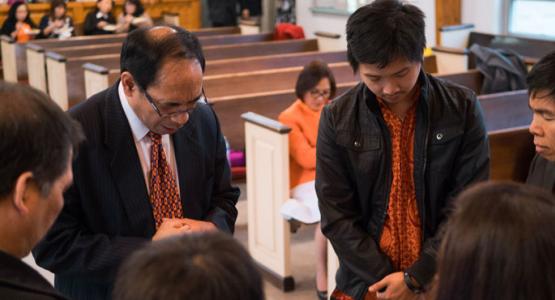
Indonesian Adventist Members in New Jersey Detained, Deported Over Immigration Status
Story By Celeste Ryan Blyden / Photos by Brian Patrick Tagalog
Members of two Indonesian Seventh-day Adventist churches in northern New Jersey are experiencing the effects of ramped up U.S. immigration reform firsthand. Dozens have been deported, voluntarily returned to their homeland or are “hiding” in the U.S.
“During the last year, we lost 21 members due to deportation over their immigration situation,” says Steven Rantung (pictured below praying with members grappling with immigration issues), pastor of Allegheny East Conference’s First Indonesian church in South Plainfield, N.J. There was a time when this church had 250 members; now there are about 65. One of them, Gunawan Liem, a married father of two, church deacon and member since 1999, was detained January 25 by Immigration and Customs Enforcement (ICE) after he dropped his 10-year-old daughter at the school bus stop. He remains in custody.
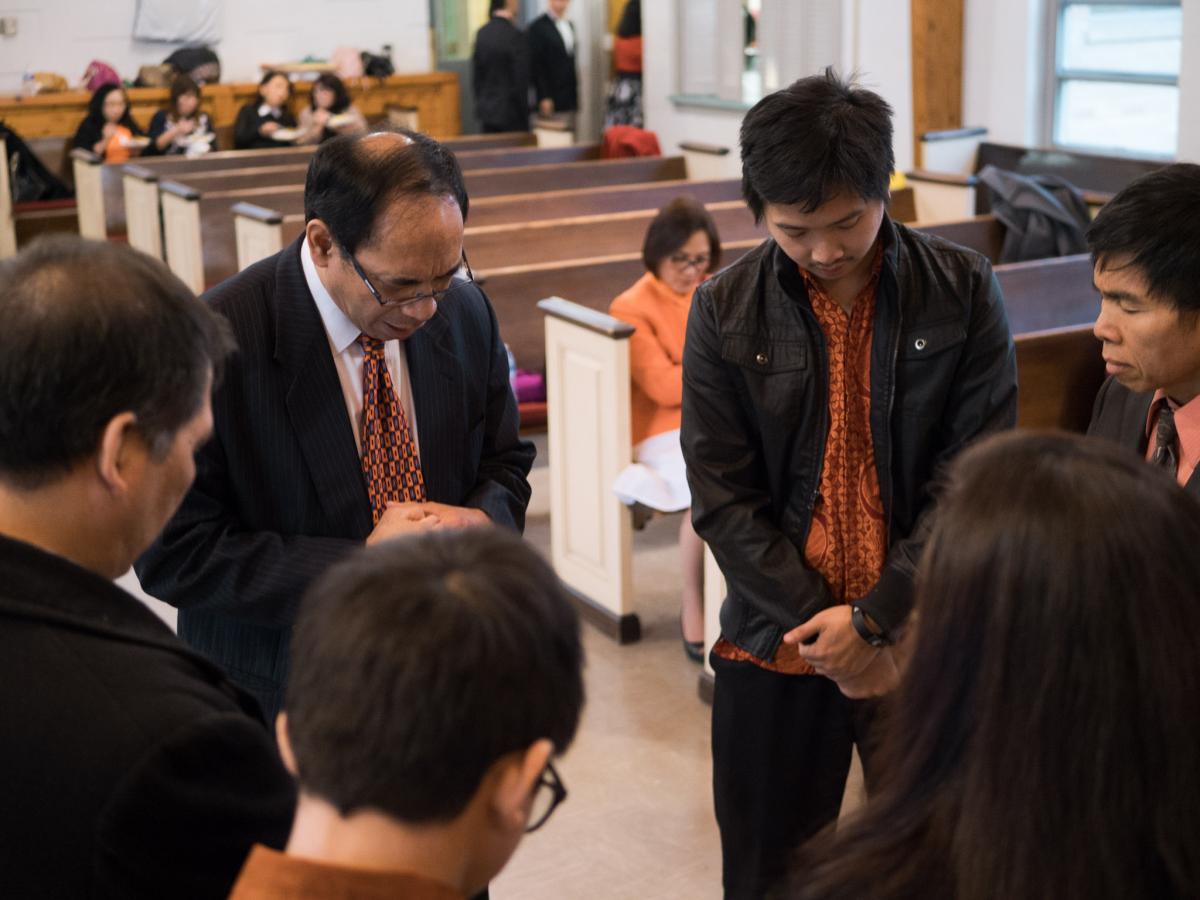 Adrie Legoh, pastor of New Jersey Conference’s Pioneer church located just four miles away in Plainfield, says he lost four to five families in the past few years. Membership (some members pictured below) now stands between 40 and 50, down from about 90. “Last fall Herry Pangkey was deported. He had been here for almost 30 years and served as one of our elders,” Legoh says.
Adrie Legoh, pastor of New Jersey Conference’s Pioneer church located just four miles away in Plainfield, says he lost four to five families in the past few years. Membership (some members pictured below) now stands between 40 and 50, down from about 90. “Last fall Herry Pangkey was deported. He had been here for almost 30 years and served as one of our elders,” Legoh says.
Several newspaper articles have reported the decades-long ordeal began in the late 1990s when Indonesia experienced a change in power that led to economic and civil unrest and the rise of radical groups that carried out hate crimes against Christians, particularly those of Chinese descent. Many of these ethnic Chinese Christians, a minority in Indonesia, escaped persecution via a U.S. visitor visa and ended up in California, Colorado, Massachusetts, New Jersey and the state of Washington. They landed jobs at factories, nursing homes, assisted living facilities and in other blue-collar roles and settled down.
Both pastors say that this is the case for many of their members and those of other denominations. Many of these immigrants overstayed their visas, and when they finally applied for asylum (lawful residency), they were denied, some more than once. Still they lived productively—they got married, started families and established small groups that grew into what remain the only Indonesian congregations in the Columbia Union to date.
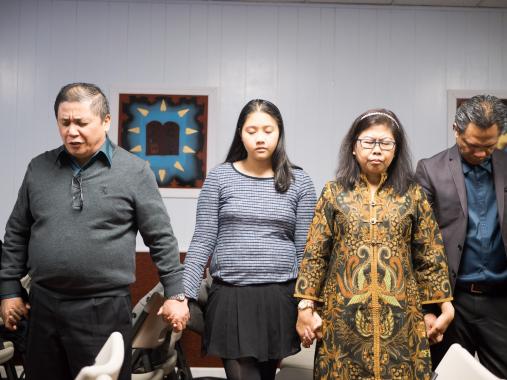
Everything Changed
Then “9/11” happened, and everything changed.
After the terrorist attacks of September 11, 2001, the U.S. established the National Security Entry-Exit Registration System that required males age 15 to 65 from the 24 largest Muslim countries in the world to be registered, fingerprinted, photographed and interviewed. Rantung says that because his ethnic Chinese members came from a primarily Muslim country, they self-reported and received either a “stay of removal” or “order of supervision.” This allowed them to remain in the country, but required them to “check in” with ICE annually or as often as requested.
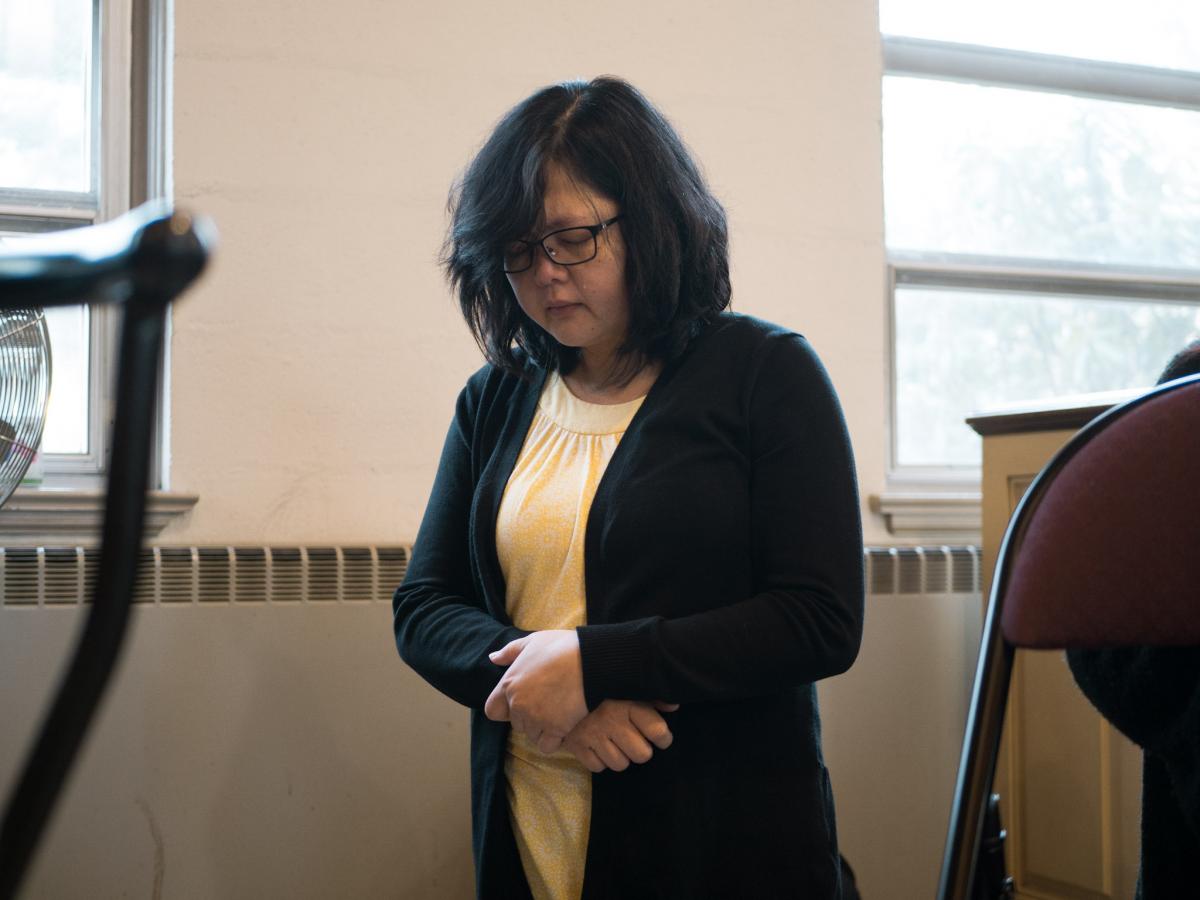 Among them was Gunawan Liem, who was single when he came to New Jersey in 1999, and now works at a local factory as a data entry dispatcher. In 2003 he married Susana (pictured above), a factory machine operator, who came to the U.S. in 2000. Rantung says they and their two children—Christopher, 13; and Naomi, 10—are active members at the First Indonesian church.
Among them was Gunawan Liem, who was single when he came to New Jersey in 1999, and now works at a local factory as a data entry dispatcher. In 2003 he married Susana (pictured above), a factory machine operator, who came to the U.S. in 2000. Rantung says they and their two children—Christopher, 13; and Naomi, 10—are active members at the First Indonesian church.
Another member, one of the founders of the Pioneer church, was deported last fall. Two of his adult daughters are in the Deferred Action for Childhood Arrivals (DACA) program; two sons-in-law, who serve in the church; and five grandchildren are at a loss as to their next steps.
“In 2017 we saw a number of the males and heads of households who are members of our church go and report and not come home. They were detained and some deported,” shares one of the son-in-laws. “My father-in-law voluntarily went to report and did not return home.”
He admits that because of this crackdown, others have not reported as scheduled. Some members quit their jobs and are living in hiding. Others have relocated from the area. Some expect that any day they could be picked up and held in a detention center indefinitely, like Liem.
“We live in fear,” says Johanes Tilaar, a husband and father of two sons who serves as first elder of the First Indonesian congregation, and says he came to the U.S. in 1996 to escape religious persecution. He also hasn’t registered this year and is constantly expecting ICE agents to come for him. “Every time I open my door or go to work, I am filled with fear,” he admits.
Ramly Siwi, who says he came to the U.S. in 1990 to escape religious persecution and to build a better life, is a co-founder of the First Indonesian church, which will celebrate its 20th anniversary in May. He and his wife have moved from their apartment temporarily to an undisclosed location. “I didn’t report last October because I don’t want to be detained like the others,” he says. Last Sabbath during potluck lunch, he said he hadn’t been to church in over six weeks, and his wife had stopped working. “We have been here more than half our lives, but we live in fear that our family will be separated,” he says.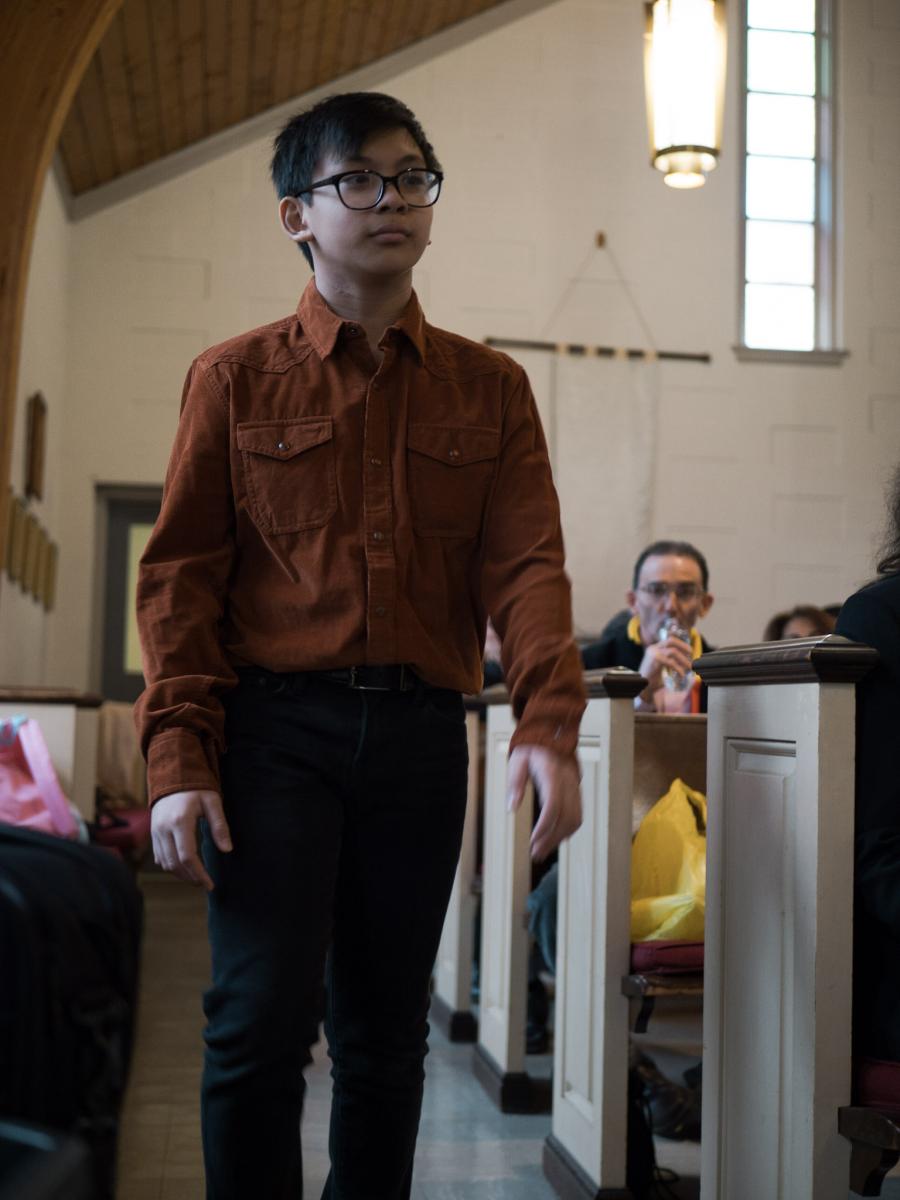
Possible separation from their children, many of whom are part of the DACA program that the U.S. Congress is presently discussing, is one of the reasons many of the immigrants seek to avoid detention and deportation. “Once you are deported, you can’t apply to return for 10 years,” explains Gonie, son-in-law of the deported Pangkey, who also has not reported to ICE this year. “And with our status, we can’t leave to go see him either, otherwise we can’t come back.”
Like most of the children born to these immigrants, Joel Masse (pictured left), 13, whose father was deported in April 2017, is caught up in an issue that has been going on longer than he’s been alive. “I think the whole thing is unfair because my dad is a good man,” he says. “I’m praying he can come back.”
Members are also praying. Pioneer’s Pastor Legoh (pictured with members below) says that every fourth Sabbath they fast and every Sunday they gather to pray for the families who are seeking to become legal residents. “As a pastor I pray to have and maintain courage and for the spiritual frame of the church,” he says.
Jorge Aguero, president of the New Jersey Conference, and administrators are also praying as they plan to assist in this ongoing immigration struggle.
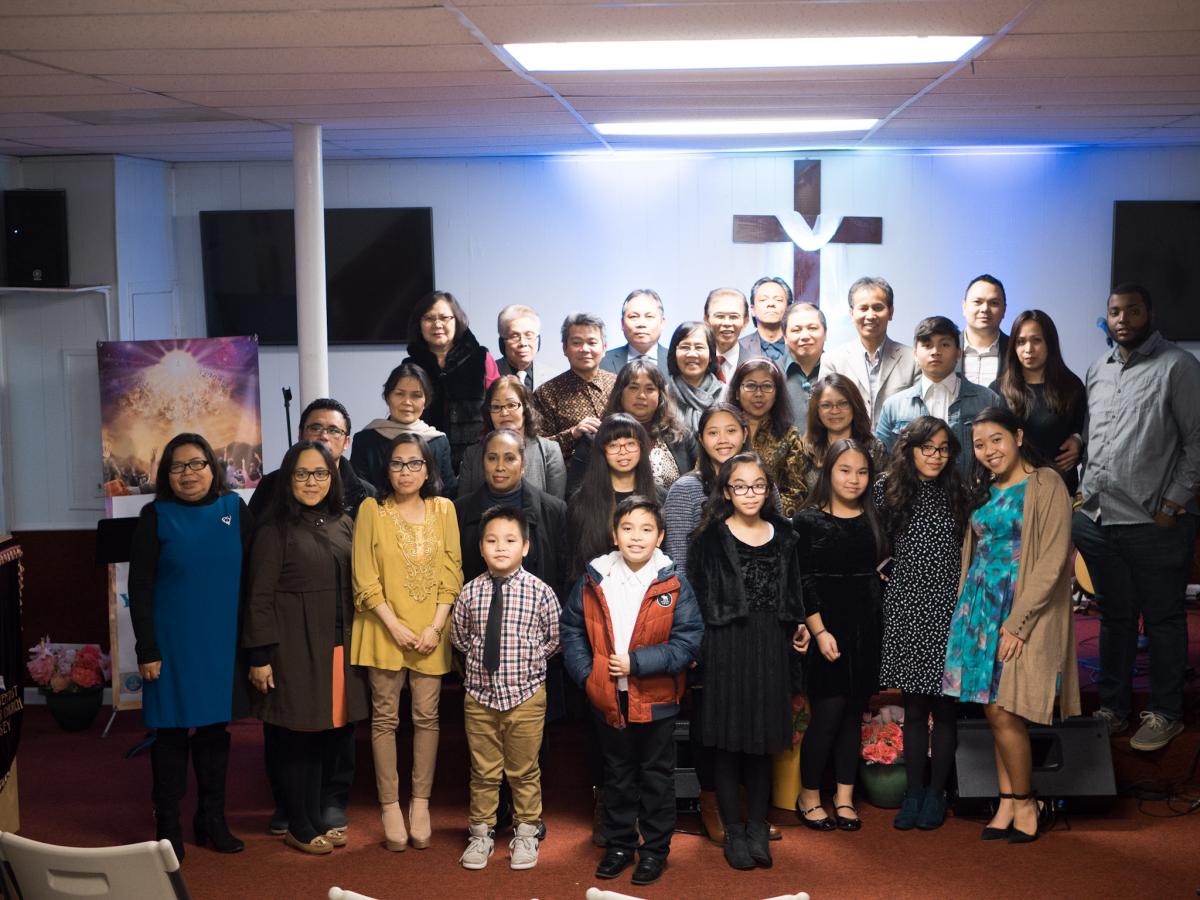
Some Reprieve
On February 2, a federal judge issued a restraining order that temporarily halts the deportation of Indonesian Christians in New Jersey without legal status, while she reviews a class-action lawsuit that seeks to allow them the opportunity to reapply for asylum. A February 2 USA Today article on this story revealed that on February 1 in a similar case, a Massachusetts federal judge ruled in favor of Indonesian Christians facing deportation.
“It has given us some reprieve, which is why I felt I could come to church today,” said Siwi, “but it still doesn’t mean we can’t be detained, just not deported for now.”
A decision is expected March 9.

Add new comment